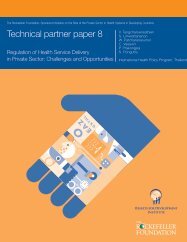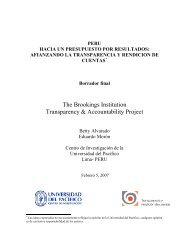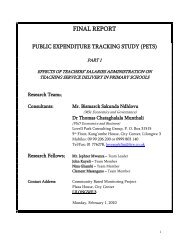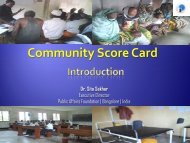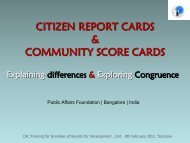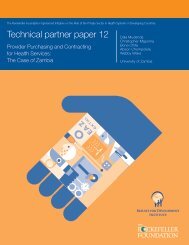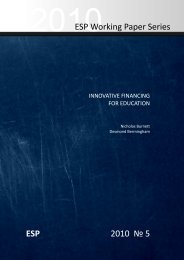Innovative Secondary Education For Skills Enhancement
Innovative Secondary Education For Skills Enhancement
Innovative Secondary Education For Skills Enhancement
Create successful ePaper yourself
Turn your PDF publications into a flip-book with our unique Google optimized e-Paper software.
f. The focus should be on providing students with<br />
relevant skills for employability, not solely skills<br />
for employment. Entrepreneurial skills are also<br />
becoming increasingly important as the informal<br />
economy continues to represent a large part of the<br />
workforce.<br />
Strengthening pedagogy is<br />
crucial for skill acquisition.<br />
a. Teachers’ inability to think of teaching as enabling<br />
learning rather than as imparting factual knowledge<br />
and also to understand the skills that students<br />
should have is one of the major obstacles to<br />
improving secondary skill acquisition, especially for<br />
non-cognitive skills.<br />
Although policy reforms in many developing countries<br />
now emphasize skills development, questions remain on<br />
the most important skills that result in employability, and<br />
how they lead to increased earnings (USAID 2012). Our<br />
study helps shed further light on this issue: we see that<br />
ensuring that youth are equipped with skills for employability<br />
will mean closer linkages between employers, educators,<br />
and policymakers, shifts in pedagogy, and a greater<br />
focus on nurturing non-cognitive skills such as communication,<br />
leadership, and entrepreneurialism. Where technical<br />
skills are necessary for employment, a close connection<br />
between educational institutions and employers is vital.<br />
Ultimately, employers seek graduates who can thrive in<br />
the workforce, and an effective skills program will prepare<br />
youth for this transition.<br />
b. Assessment methods should be modified to assess<br />
a wider range of skills; this shift may also then<br />
encourage a change in teaching methods.<br />
c. Extracurricular activities can be very important for<br />
acquiring non-cognitive skills, yet these activities<br />
are relatively downplayed by teachers, especially in<br />
Africa.<br />
d. Especially in Africa and South Asia, vocational<br />
education is insufficiently practical.<br />
24 <strong>Innovative</strong> <strong>Secondary</strong> <strong>Education</strong> <strong>For</strong> <strong>Skills</strong> <strong>Enhancement</strong> (ISESE)





